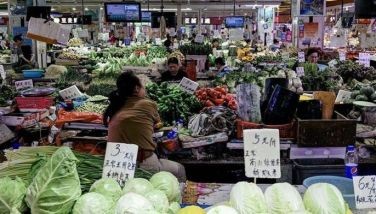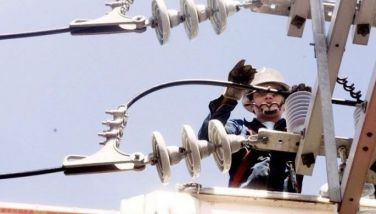President Duterte’s lament and the road to self-sustaining economic growth

Speaking before his own Presidential Security Group recently, President Duterte lamented that Philippine development has been behind that of our neighbors.
“Every time I (visit) other countries like Indonesia and Singapore,” he said, “and you can see the progress of those countries, I’m moved to tears. (I become) misty-eyed when I think of my country because we’re like an airplane that cannot takeoff.”
The economic score. President Duterte has traveled extensively to different ASEAN countries since taking office, and although these visits have been brief, they yield visual impressions and sufficiently acute observations concerning the level of economic development of these countries.
At the inception of our independence immediately after the Second World War, we were generally considered to be well endowed and sufficiently ahead in potential development and in capacity compared to any of these countries.
Today, objective measures indicate we are badly behind some of our neighbors. It’s not that we are an economic basket case, but we nearly were, for some time. Disunity, fractious political divisions and political instability, sometimes wrong and inconsistent policies and regulations, have helped to negate higher growth performance.
In 2015, Philippine per capita gross national income (GNI) of $8,940, measured in dollars of equal purchasing power, lags behind successful ASEAN countries: Singapore ($81,360); Malaysia ($26,810); Thailand ($15,520); and Indonesia ($10,070).
In reality, such numbers are no mere statistical indicators. They convey measurable indicators of well-being enjoyed by the citizens of these countries. The higher the per capita purchasing power income, the more the citizens of the country can have better levels of health care and therefore longer life, more quantity and quality of consumption, and improved well-being overall.
Any leader worth his salt would thus be challenged to aim for something higher and more ambitious. These countries alone provide guideposts for what is possible!
So we have a picture of the magnitude of our President’s discomfort as far as it concerns his vision of what is possible.
Progress in economic reforms. In the short time since taking office, many national and sector policies have been up for scrutiny and challenge under his watch.
He might be focused on a few things – anti-corruption, the war on drugs, and peace and order – but many aspects of national life are also up for potential change based on visions of economic improvement.
In the course of the country’s postwar history, many economic reforms have been undertaken as far as they refer to the production and trading of goods and services. Thus, the country has experienced liberalization in many areas of the economy.
Yet, one area remains that continue to hamper the further growth of the country: policies broadening the control over scarce economic resources – land and capital -- insofar as the exercise of economic power is concerned. These continue to be highly concentrated in few hands.
Until the economic provisions of the Philippine constitution are dealt with properly – and this is part of the current agenda of economic and political change – it is important that all reforms will have to work on the margins of what is possible, given the circumstances.
In the few months that President Duterte has been in office, difficult problems have cropped up on the economic front. It is comforting to learn that in critical policy areas where damaging changes in economic policy could happen, it has been possible for the government to hold the fort by sticking to sensible change.
For instance, the labor market need not suffer shock as a result of the “the ending of contractualization, or endo.” Sensible solutions have come up that stresses that the generation of employment is the main goal while correcting labor contracting inequities after consulting all major stakeholders.
Another instance of populist demands – enacting pension increases for members of the Social Security System – is not likely to come unless the means of financing those pension increases are found. Tax revenues cannot be made the source of bottomless subsidies for the short term good.
It is to the credit of President Duterte that he listens to his trusted economic managers in pursuing his economic program. It is good that he recognizes his limitations in dealing with these issues and defers to proper advice from more knowledgeable assistants who understand his long term objectives. Hopefully, this continues to rule the game of economic reforms.
The tax reform program: the ultimate test. The true test of whether the Duterte government can take the road to self-sustaining growth revolves around the recently announced tax reform program.
If this bold reform program gets approved, the goal of achieving sustained growth would be near in sight, provided he sticks to the goal of achieving the 10-point economic program – which of course represents another test of will.
The next stage would be to use the proceeds of the tax reforms to help finance the government’s major development budget of expenditures: more infrastructure, more expenditure on social reforms and programs, more budgeting for the support of educational investments and direct anti-poverty programs through the use of the CCT (conditional cash transfer, or 4Ps – Pantawid Pamilyang Pilipino Program; bridging toward less poverty).
I have described various components of the tax reform program in previous columns. It is the most ambitious since the 1980s. It is well-conceived and takes into account lessons from other countries.
The tax reform program is comprehensive and contains different cohesive parts that help to produce a larger revenue for financing the government’s development program while realigning also the tax burden across income classes in support of national development.
Recently the Foundation for Economic Freedom had contacted and gotten support from a wide spectrum of public officials who have ever dealt with tax collection and revenues allocations for economic development. In this spirit, many former secretaries of finance, planning officials at NEDA and budget officials have recommended that the tax reform program be adopted.
This is the only way the government can scale up the programs of increasing public spending to sustain the development and growth effort close to seven percent per year. Failure to enact it while spending for the same programs of investments and public service will induce inflationary pressures.
Any failure to pass the important components of this program or to scale it down in terms of revenue productiveness could cause either a reduction in goals or, if continued, could induce more inflationary pressures as more budgeted expenditure by the government is undertaken.
My email is: [email protected]. Visit this site for more information, feedback and commentary: http://econ.upd.edu.ph/gpsicat/
- Latest
- Trending






























